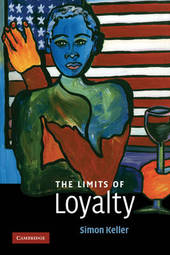
|
The Limits of Loyalty
Paperback / softback
Main Details
| Title |
The Limits of Loyalty
|
| Authors and Contributors |
By (author) Simon Keller
|
| Physical Properties |
| Format:Paperback / softback | | Pages:248 | | Dimensions(mm): Height 229,Width 152 |
|
| Category/Genre | Ethics and moral philosophy |
|---|
| ISBN/Barcode |
9780521152877
|
| Classifications | Dewey:179.9 |
|---|
| Audience | | Professional & Vocational | |
|---|
| Illustrations |
Worked examples or Exercises
|
|
Publishing Details |
| Publisher |
Cambridge University Press
|
| Imprint |
Cambridge University Press
|
| Publication Date |
5 August 2010 |
| Publication Country |
United Kingdom
|
Description
We prize loyalty in our friends, lovers and colleagues, but loyalty raises difficult questions. What is the point of loyalty? Should we be loyal to country, just as we are loyal to friends and family? Can the requirements of loyalty conflict with the requirements of morality? In this book, originally published in 2007, Simon Keller explores the varieties of loyalty and their psychological and ethical differences, and concludes that loyalty is an essential but fallible part of human life. He argues that grown children can be obliged to be loyal to their parents, that good friendship can sometimes conflict with moral and epistemic standards, and that patriotism is intimately linked with certain dangers and delusions. He goes on to build an approach to the ethics of loyalty that differs from standard communitarian and universalist accounts. His book will interest a wide range of readers in ethics and political philosophy.
ReviewsReview of the hardback: 'Loyalty is at once a non-negotiable value and the root of much suffering. Coming to terms with this duality, Simon Keller argues in his timely and important. The Limits of Loyalty, requires that we recognize not one kind of loyalty, but a diversity of loyalties, some of which merit our allegiance, and some not. The result of this compelling reconsideration is a subtle and shrewd work of philosophical moral psychology, which will not only provoke unsettling reflection on the most vexing and indispensable of human relations - lovers, friends, family, and country - but also revivify central debates in philosophical ethics and political theory. It deserves to be widely resonant.' John M. Doris, Washington University, St. Louis Review of the hardback: The Limits of Loyalty is a refreshingly original, cogently argued and lucid work. It is first-rate, important and readable philosophy. David Lyons, Boston University Review of the hardback: 'Simon Keller's The Limits of Loyalty is a bold and careful, dramatic and soundly argued examination of loyalty, its obligations, its psychology and its impact on morality. Keller argues that personal loyalty and political patriotism cannot be considered unqualified virtues. Because their partiality is susceptible to dangerous moral blindness, their exercise needs to be defended and justified by larger and more encompassing moral considerations. This important book raises fundamental questions in moral theory; it addresses them clearly, with a wealth of convincing examples.' Amelie Rorty, Harvard University Review of the hardback: 'Fascinating - a clear-sighted and often surprising philosophical exploration of loyalty in our lives as parents or friends, lovers or patriots. With a calm and dryly humorous eye, Keller weighs up the complexities, both moral and epistemological, of commitments that are too readily taken for granted.' Rae Langton, MIT Review of the hardback: 'This smart, stimulating, and challenging book is a welcome addition to the relatively sparse philosophical literature on loyalty. ... for those ... who believe that loyalty has been unfairly neglected and who accord it a more central moral place, this volume is delightfully provocative. ... it represents the best discussion we have of loyalty.' Notre Dame Philosophical Reviews Review of the hardback: '... Keller provides a rich variety of illustrations ... He articulates a well-written argument ... The Limits of Loyalty is a well-written, fascinating, thought-provoking and unsettling book that certainly deserves to be read. ... [The book] introduces in that great conversation of how and why we are meant to live the good life.' Review of Politics
|